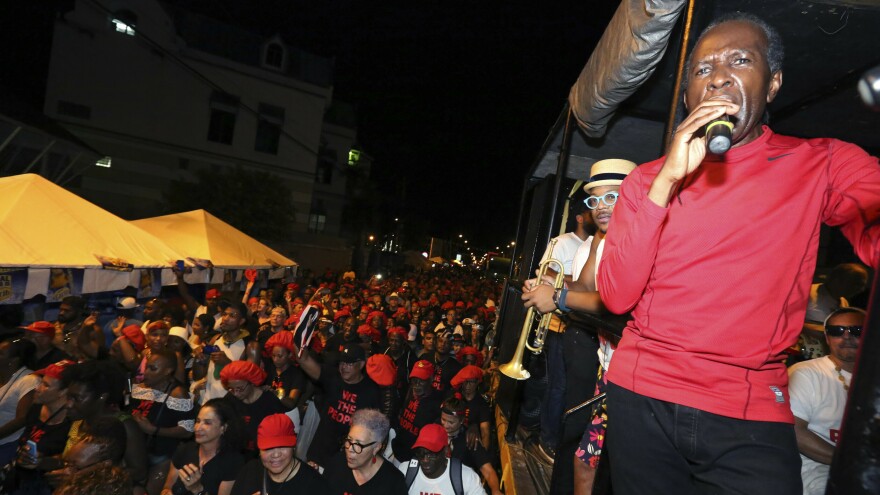Hip-hop isn't the only cultural movement celebrating its golden anniversary this year; soca, the up-tempo, propulsive descendant of calypso created in Trinidad and embraced across the Caribbean diaspora, also celebrated its golden anniversary this year.
Soca, like calypso and the steel pan, the national instrument of Trinidad & Tobago, developed from festivities associated with Trinidad's world-renowned pre-Lenten carnival. In the late 1700s, French settlers in Trinidad brought their costume ball traditions to the island; the West African slaves there were forbidden from participating. With the emancipation of slavery in 1834, freed Africans developed their own rituals and, over time, these practices produced` calypso, the steel pan and elaborate, colorful masquerading, called "playing mas," concentrated in the streets of Trinidad's capital Port of Spain during carnival's climax, the Monday and Tuesday preceding Ash Wednesday.
Throughout the carnival season, which roughly spans Dec. 26 through Ash Wednesday, artists from T&T and throughout the Caribbean release new soca, providing the various parties and competitions their high-energy soundtracks. Over the past half-century soca has, like anything else, evolved considerably, absorbing various influences including R&B and funk in the mid-'70s, disco in the late '70s and early '80s, hip-hop and dancehall reggae in the '90s, and electronic and Afrobeats through this century.
Below, NPR Music celebrates and looks back on 50 years of the form, choosing one song per year to trace the genre's shifting sound. Many selections have won Trinidad carnival's prestigious competitions – the Calypso Monarch, Soca Monarch and Panorama, where steel bands with as many as 125 players compete, performing complex arrangements of popular hits. Many classics will be omitted from this list due to the abundance of annual soca releases, and a few top choices aren't included because they are unavailable via streaming services. After a two-year break caused by the pandemic, Trinidad carnival returned this year, concluding on Wednesday.
Luckily, from this year's musical offerings the singer Voice has gifted us an appropriate title for our playlist: "Long Live Soca!"
Soca's history: a timeline in song
1973 – Lord Shorty, "Indrani"
In 1973, calypso artist Lord Shorty recorded "Indrani," a song that fused Indian instrumentation with African-influenced calypso rhythms, bringing together Trinidad's dominant ethnic groups in what he explained, in Dr. Rudolph Ottley's book Calypsonians from Then to Now Part I, as "the soul, the spirit, the depth of calypso." It was the result of intentional experimentation to modernize the structure of calypso, the first recorded music of the English-speaking Caribbean, in a bid to make it more palatable to wider audiences. Lord Shorty incorporated into calypso's beat the dholak, a small drum of Indian origin, and the dhantal, an iron-rod percussion instrument, both essential components in an Indo-Trinidadian music called chutney. Despite initial protests – that Shorty was destroying calypso and ridiculing Indian culture with the song's suggestive lyrics – "sokah" was here to stay (a journalist's altered spelling of Shorty's new style eventually stuck).
- 1974 – Shadow, "Bassman"
1975 – Lord Shorty, "Endless Vibrations"
On this 1975 release, Shorty removed the Indian instrumentation from soca but retained its chutney rhythms on the drums and guitar. Shadow's "Bassman," Scrunter's "Woman on the Bass" and Maestro's "Fiery" brought melodic, bass-driven rhythms with funk and soul accents to the music's forefront, an approach that would underpin soca well into the next decade.
- 1976 – Cecil Hume Maestro, "Fiery"
- 1977 – King Short Shirt, "Tourist Leggo"
- 1978 – Calypso Rose, "Her Majesty"
- 1979 – Scrunter, "Woman On De Bass"
- 1980 – Blue Boy, "Soca Baptist"
- 1981 – Explainer, "Lorraine"
1982 – Arrow, "Hot Hot Hot"
Arrow's bubbling soca fusion of rock guitars and cascading horns, the latter characteristic of soca's golden age, drove "Hot Hot Hot" and it became soca's first truly global hit (prior to Buster Poindexter's 1987 smash-hit cover version) and remains, arguably, the genre's best-known song. Before his passing in 2010, Arrow said he estimated the sales of "Hot Hot Hot" at 12 million copies worldwide, a phenomenal figure for an independently released soca single.
- 1983 – Sparrow, "Phillip My Dear"
- 1984 – Byron Lee and the Dragonaires feat. Justin, "Hero" / Cassell, "Tiney Winey"
- 1985 – Merchant, "Rock It"
1986 – David Rudder, "The Hammer"
Another pivotal moment for soca in this decade was the emergence of David Rudder, who in 1986 achieved a sweep of major carnival titles with the samba-flavored "Bahia Girl'' and "The Hammer," a poetic, poignant celebration of Rudolph Charles, an innovator in the steel band movement who had died the previous year. Throughout his career, Rudder has retained calypso's vital story-telling tradition while boldly experimenting with the sonic identity of his soca brand; his music from the 1980s through the mid 2000s is considered a gold standard. On July 3 last year, Rudder was conferred with the Order of the Caribbean Community, the highest regional honor, for his immense cultural contributions.

- 1987 – Lord Kitchener, "Pan In A Minor"
- 1988 – Shadow, "Tension"
- 1989 – Christopher "Tambu" Herbert and Charlie's Roots, "Free Up"
- 1990 – Burning Flames, "Workey Workey"
- 1991 – Super Blue, "Get Something and Wave"
- 1992 – Brother Resistance, "Crucial Decision"
- 1993 – Red Plastic Bag, Mac Fingall, "Ragga Ragga"
- 1994 – The Mighty Gabby, "Dr. Cassandra"
- 1995 – Krosfyah, "Pump Me Up"
- 1996 – Sonny Mann, General Grant and Denise Belfon, "Lootala"
1997 – Machel Montano, "Big Truck"
In the early '90s, Super Blue's "Get Something and Wave" spurred audiences at soca fetes to jump and wave their rags and flags – it was a more aggressive, faster paced version of the music, which would be referred to as power soca. But most notable that decade was the elevation of Machel Montano to superstar (where he has remained) with his raucous "Big Truck" from 1997.
As a teenager in the early-to-mid '90s, motivated by the success of Barbadian artists at carnival and with the intention to make T&T's soca more appealing to his peers, Machel and his band Xtatik simplified soca's sound, infusing hip-hop beats and dancehall riddims into the music. Machel has since been a consistent hitmaker in the genre and a tireless ambassador for it, working with various international collaborators including Ashanti, Ariana Grande and Trinidad-born rapper Nicki Minaj. Machel made history in September as the first soca artist to sell out Brooklyn's Barclays Center.
- 1998 – David Rudder, "High Mas (Give Praise)"
- 1999 – 3Canal, "Talk Yuh Talk"
- 2000 – Tallpree, "Old Woman Alone"
- 2001 – Krosfyah, "Sak Pasé"
- 2002 – Militant, "Passion"
- 2003 – David Rudder, "Trini 2 De Bone"
- 2004 – Kevin Lyttle, "Turn Me On"
2005 – Rupee, "Tempted to Touch"
Midway through the 2000s, two soca songs initially made their way onto the Billboard Hot 100, an unprecedented, and to date unmatched, feat for soca. Kevin Lyttle's "Turn Me On," originally released for carnival in the eastern Caribbean island of St. Vincent, then remixed with a stronger R&B/dancehall flavor, featuring Jamaican toaster Spragga Benz, peaked at No. 4. Then, "Tempted To Touch," a tuneful soca-pop gem by Rupee that initially enjoyed popularity at Barbados' Crop Over, peaked at No. 39 in August 2004 and remained on the tally through early 2005. Both artists signed to Atlantic Records, which branded them as "the new soul of soca." While their respective albums, Kevin Lyttle and Rupee's 1 on 1, didn't take soca into the mainstream as Sean Paul did for dancehall reggae during that decade, their singles nonetheless acquainted an international audience with pop-edged, modern carnival sounds.
- 2006 – Alison Hinds, "Roll It Gal"
- 2007 – Machel Montano, "Jumbie"
- 2008 – Farmer Nappy, "Chippin' (With Meh Own Woman)"
- 2009 – Black Stalin, "One Slave"
- 2010 – Lil Rick, "Guh Down"
- 2011 – Kes The Band, "Wotless"
2012 – Bunji Garlin, "Differentology (Ready Fi De Road)"
As the 2010s progressed soca's pace, overall, was slowed down, with EDM and Afrobeats bearing strong influences. Initially released in November 2012, Bunji Garlin ruled carnival 2013 with his soca-meets-EDM hit "Differentology," his robust vocals closely aligned with dancehall reggae toasting. A Major Lazer remix took the song to raves and EDM festivals around the world. Sputtering EDM effects were also heard in Ultimate Rejects' carnival 2017 sensation, "Full Extreme," Montano's infectious "Happiest Man Alive," the joyous "Leh Go" by Blaxxx, and Destra Garcia's irresistible, wild-child narrative "Lucy."

- 2013 – Blaxx, "Leh Go"
While EDM's impact has since receded, Afrobeats now exerts an even stronger sway. Olatunji Yearwood's tuneful Afro-soca "Oh Yay" embodies the reciprocal influences between the two genres, a splendid follow-up to his similarly flavored hit "Ola." Likewise, Kes The Band had their first major carnival hit in 2011 with "Wotless," which weaves an engaging West African guitar loop throughout while their 2018 Afrobeats seasoned single "Hello," with over 70 million combined YouTube/Spotify streams, the most streamed soca song released in the last decade.
- 2014 – Machel Montano, "Happiest Man Alive"
- 2015 – Destra Garcia, "Lucy"
- 2016 – Olatunji Yearwood, "Oh Yay"
- 2017 – Ultimate Rejects feat. MX Prime, "Full Extreme"
- 2018 – Kes The Band, "Hello"
- 2019 – Skinny Fabulous, Machel Montano, Bunji Garlin, "Famalay"
- 2020 – Nailah Blackman, "More Sokah"
- 2021 – Lyrikal, "Happy Place"
- 2022 – Patrice Roberts, "Mind My Business"

2023 – Aaron 'Voice' St. Louis, "Long Live Soca"
Trinidad's carnival was one of the last major events held in 2020 prior to the COVID-19 global shutdown. During the lockdown of mid-2020 through 2022, many soca artists took a deserved break from the rigors of delivering new music each season, while others performed virtual concerts or continued to record and release music even without carnivals to promote it. "Happy Place" by Lyrikal arrived at the height of the lockdowns, its positive vibrations and upbeat tempo lifting moods at a very confusing and isolated time. Patrice Roberts released her biggest song to date "Mind My Business," written by Mical Teja Williams. You may have seen the song's often-quoted lyric, "I go drink water and mind my business," around social media; Roberts is now soca's most-streamed female artist.
With Carnival 2023 just concluded, this season's soca releases included many songs expressing gratitude for the festival's return. Aaron "Voice" St. Louis, who made his mark in the previous decade by winning the Soca Monarch title for three consecutive years, hits all the right notes on "Long Live Soca," his joyous paean to carnival and the distinctive elements that make it such a glorious celebration. Especially its music.
Copyright 2023 NPR. To see more, visit https://www.npr.org.



